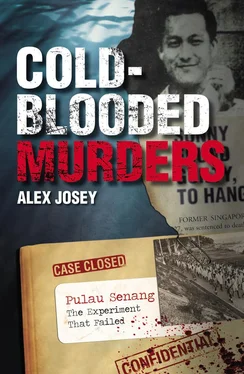Alex Josey - Cold blooded murders
Здесь есть возможность читать онлайн «Alex Josey - Cold blooded murders» весь текст электронной книги совершенно бесплатно (целиком полную версию без сокращений). В некоторых случаях можно слушать аудио, скачать через торрент в формате fb2 и присутствует краткое содержание. Жанр: Криминальный детектив, на английском языке. Описание произведения, (предисловие) а так же отзывы посетителей доступны на портале библиотеки ЛибКат.
- Название:Cold blooded murders
- Автор:
- Жанр:
- Год:неизвестен
- ISBN:нет данных
- Рейтинг книги:5 / 5. Голосов: 1
-
Избранное:Добавить в избранное
- Отзывы:
-
Ваша оценка:
- 100
- 1
- 2
- 3
- 4
- 5
Cold blooded murders: краткое содержание, описание и аннотация
Предлагаем к чтению аннотацию, описание, краткое содержание или предисловие (зависит от того, что написал сам автор книги «Cold blooded murders»). Если вы не нашли необходимую информацию о книге — напишите в комментариях, мы постараемся отыскать её.
Cold blooded murders — читать онлайн бесплатно полную книгу (весь текст) целиком
Ниже представлен текст книги, разбитый по страницам. Система сохранения места последней прочитанной страницы, позволяет с удобством читать онлайн бесплатно книгу «Cold blooded murders», без необходимости каждый раз заново искать на чём Вы остановились. Поставьте закладку, и сможете в любой момент перейти на страницу, на которой закончили чтение.
Интервал:
Закладка:
Ang was completely callous. That Jenny had to die was a misfortune on her part: her death was no more than a mere incident in his own life. All that he regretted, he said shortly before he was hanged, was that he did not give her a decent last meal. He also regretted that he had failed to insure her for a higher figure. Curiously enough, he had decided that, with part of the money he hoped to get from the insurance companies, he would provide for Jenny’s two children during their childhood.
His callousness was evident immediately after her death. When he informed the police and the insurance companies of the tragedy, he did so calmly, and with such lack of compassion that suspicions were aroused. Noted K. B. Ong, a police officer in his report, ‘The general conduct of Sunny Ang after the disappearance, and during interrogation-he does not appear in the least worried or depressed.’
Ang was confident he could never be incriminated for Jenny’s death. Why should he worry? Life, until his arrest 16 months later, went on as usual-chicken farming and girl-chasing. He sat for the Higher School Certificate in 1964. Throughout his trial his confidence actually increased and he made little effort to conceal his disdain for, and contempt of, the legal machinery. He insisted upon directing counsel for the defence, supremely confident his guilt could never be proved. Against the advice of Mr Coomaraswamy he insisted on entering the witness-box entirely for the immediate emotional satisfaction of crossing swords, matching wits, with Mr Francis Seow, the state prosecutor, whom he hated as the representative of society and law and order.
He continued to be confident after sentence, while in prison. He read books in German, French, Chinese and English. He continued to give advice to his brothers in Singapore and in England, on how to improve their studies. The only time he was known to have shown emotion was when his father went to the prison in November 1966 (for the first time since Ang’s arrest in December, 1964) to tell him that the Privy Council had rejected his appeal. Ang burst into tears. But he soon recovered and quickly regained his confidence that, somehow, his concept of justice would eventually emerge triumphant: after all ‘they’ had not found out how exactly he had caused Jenny’s death, so ‘they’ were not entitled to claim the supreme forfeit.
In his last speech from the Singapore Bench in 1968, Justice Buttrose stressed the importance of maintaining and administering justice. He was mindful that ‘justice, like lightning, should ever appear to few men’s ruin but all men’s fear’.
He considered himself privileged to have offered the greater part of his working life, some 23 years, to the cause of justice according to law, the rule of law, the cornerstone of human rights and human freedom.
Justice Buttrose said, “It is more than ever essential in this present day and age that the rule of law should be preserved inviolate: that those who respect and obey it shall live in freedom and security under it; that those who flout it and seek to set it at nought shall be brought to book and punished.”
He said that the interpretation of the law was a different matter and each court also had a different atmosphere-with each judge bringing to his court the aura of his own personality.
“I must admit I have in my time been the author and at times the beleaguered recipient of some animated controversial opinions regarding the interpretation of laws.” Justice Buttrose added, “It is perhaps inevitable that our human nature gives birth on such occasions to passing feelings of disagreement and criticism, or irritability and impatience.
Pulau Senang-The Experiment that Failed
Introduction
This is the true story of an idealistic belief, translated into actuality for a short while in the early 1960s, that violent, lawless men could find their own way back to decent society were they given a proper chance to work and create. The argument was that these men had drifted into crime because they’d never had an opportunity to know disciplined creative work.
Hundreds of them in Singapore were given this chance in 1960. Inside a few months, hitherto work-shy gangsters (hardened criminals most of them, unproven murderers, extortioners, callous robbers, psychopaths, rapists), transformed a deserted tropical island into an attractive, busy settlement with roads and water supply, huts, workshops, canteen, dormitories, laundry, community hall. Practically all the criminals were members of secret societies. Having built a comfortable settlement with their own hands, within forty minutes one sunny afternoon, they deliberately destroyed it and murdered the man largely responsible for making the scheme possible. With him died three of his assistants.
The island was called Pulau Senang. In the Malay language this means ‘the island of ease’. As a rehabilitation settlement, it was a noble experiment that failed. Why? Why did the gangsters destroy it, having toiled and sweated in the tropical sun to build it? No completely satisfactory explanation has been forthcoming. One belief is that the leading secret society chief on the island ordered the destruction of the settlement to prove that he was more powerful than the government. During the trial of this man, Tan Kheng Ann, alias Robert, alias Robert Black alias Ang Chuar (and 58 others), witnesses said that the decision to kill the man in charge, 39-year-old Prison Officer Daniel Stanley Dutton, was because Dutton had tormented them beyond endurance. Breaking point had been reached when he ordered 13 carpenters to work overtime to complete the construction of a pier which could be worked on only during certain tides. When the carpenters refused, Dutton ordered them back to Changi jail, thus blighting their hopes for rehabilitation. Witnesses said this decision inflamed the rest of the men and triggered off the revolt. Another belief is that the secret society chief had tormented the opposition to Dutton and had been waiting for just such an opportunity before giving the order to attack and burn the settlement to the ground.
Pulau Senang Rehabilitation Settlement originated in the mind of a political prisoner of the British. Though he admitted that he was well-treated himself in detention as a pro-communist subscribing to the violent overthrow of colonialism, Devan Nair was horrified at the conditions in the prisons for convicted criminals, and for criminal suspects detained indefinitely without trial. He was determined one day to do something about this.
Daniel Button’s Belief
In Singapore at the time was prison officer Dutton, a strong man who believed that work was the salvation of all. Dutton’s stubborn faith was that even hardened criminals, secret-society gangsters, could be saved, brought back into the community again to become useful citizens. His almost fanatical belief was that men usually went astray through idleness. They needed a chance to work, to create. Given this opportunity, with persuasion, guidance, supervision, and helpful discipline, they could find their own way back to decency. Dutton believed this: few men were naturally evil: they wanted a chance to create. Dutton died a terrible death trying to prove he was right. “All our evils can be conquered by hard work: we can sweat the evil out of us,” he told me. I knew him well. He was an Irishman born in Walthamstow, London. On Pulau Senang they called him the ‘Laughing Tiger’. In the East, everyone, including gangsters, respects a tiger. Dutton refused to arm any of his staff. He was a powerful man and ruled with his fist. If a prisoner was insolent, he would knock him down with a blow. “If I report him for insubordination, he knows he will have to go back to Changi and that will be the end of him. He’ll rot there. So he takes my punishment and behaves himself.”
Читать дальшеИнтервал:
Закладка:
Похожие книги на «Cold blooded murders»
Представляем Вашему вниманию похожие книги на «Cold blooded murders» списком для выбора. Мы отобрали схожую по названию и смыслу литературу в надежде предоставить читателям больше вариантов отыскать новые, интересные, ещё непрочитанные произведения.
Обсуждение, отзывы о книге «Cold blooded murders» и просто собственные мнения читателей. Оставьте ваши комментарии, напишите, что Вы думаете о произведении, его смысле или главных героях. Укажите что конкретно понравилось, а что нет, и почему Вы так считаете.












